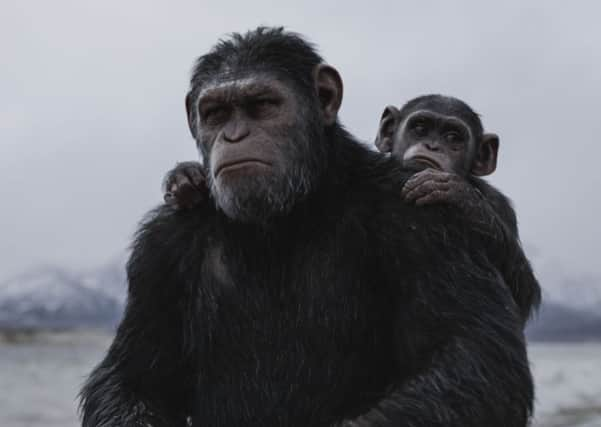Film reviews: War for the Planet of the Apes | Cars 3 |David Lynch: The Art Life


War for the Planet of the Apes (12A) ****
Cars 3 (U) *
David Lynch: The Art Life (15) ****
Despair at humanity’s collective cruelty and hubris has always been at the heart of the Planet of the Apes movies, so it’s no surprise that the current iteration of the long-running franchise has been one of the more intelligent and urgent blockbuster revivals of recent years. A prequel saga to the 1968 original, the previous two instalments – 2011’s Rise of the Planet of the Apes and 2014’s Dawn of the Planet of the Apes – had a ripped-from-the-headlines quality that suggested their makers were more interested in holding a mirror up to society than figuring out how much money could be squeezed from the concept.
The good news about War for the Planet of the Apes is that it continues in that vein. Arriving in cinemas after some pretty significant political shocks have left many of us god-damning the maniacs to hell for their ruinous, ill-thought-through voting choices, it’s a movie that feels perfect for the times, largely because the times feel terrible and the prospect of rooting for another species to replace our own seems entirely natural. Returning director Matt Reeves (who co-wrote and directed Dawn…) certainly capitalises on the allegorical simplicity of the series, picking up the action a couple of years after the last film concluded with the apes, led by talking chimp Caesar (Andy Serkis), forced to defend themselves against their already depleted human aggressors. Now the apes face a new threat in the form of a far more desperate and megalomaniacal military commander, who seems intent on making his corner of America great again by enslaving the apes in a bid to simultaneously reassert human dominance and build a wall-lined compound that will keep external threats at bay.
Advertisement
Hide AdPlayed by Woody Harrelson, the Colonel, with his balding pate and awareness of mankind’s rapidly approaching obsolescence, is a troubling nemesis for the wise and noble Caesar. He’s a man whose savagery is bound up, Kurtz-like, in his fear of losing what he thinks makes him human, not what makes him humane, and Caesar – who is haunted still by the death by his own hand of his more radicalised and dangerous ape nemesis Kobo in the previous outing – is wrestling with how to lead his own rapidly evolving species in a way that doesn’t simply repeat the mistakes of their forebears.
War for the Planet of the Apes is more philosophical in this way than the average summer blockbuster, but it still delivers the spectacle of a war movie, just without the endless reams of explosions that could easily have made the combat meaningless. Reeves also takes his time building up to the action, preferring to focus more on his simian characters as they confront each new challenge in their ongoing battle for survival. Rendered in ape form using motion capture technology, the casts’ performances offer a level subtlety and detail here that’s mesmerising precisely because of how much humanity bleeds through. “Your eyes. They’re almost human,” says Harrelson’s character when confronted by Caesar up close. It’s hard to disagree.
Serkis deserves genuine praise for the way he’s continually helped evolve this performance style and Karin Koval is wonderful too as Maurice, the soulful orangutan on hand to offer wise counsel to Caesar. Steve Zahn also joins the cast as the erroneously named Bad Ape, a delightfully openhearted chimp whose ability to talk – most of the apes communicate by signing – surprises Caesar while confirming his suspicion that there must be more apes out there like them.
The film seeds a few more clues about how the movies will eventually link up with the Charlton Heston-starring original, but this isn’t a movie that feels like it’s needlessly prolonging the story. If no other films were made in the series, this one’s elegiac finale would be a fitting end point. These apes feel like our best selves.
Cars 3 is latest spluttering entry into Pixar’s brand-tarnishing, if highly profitable, series about a world inhabited by talking automobiles. Once again revolving around race car Lightening McQueen (voiced by Owen Wilson), this time out he’s forced to confront the fact that his own track days may be over now that new computer-enhanced supercars are transforming the sport he loves with skill-eliminating technology. Essentially fusing the plots of Rocky IV and Rocky Balboa, this chop-shopped family film is Pixar at its absolute worst.
It’s time the studio got back to making original movies.
David Lynch has been a singular talent since he emerged fully formed on the film scene with his industrial nightmare freak-out Eraserhead in 1977. How he got to that point is the subject of Jon Nguyen and Rick Barnes’ intriguing and illuminating documentary David Lynch: The Art Life. Comprised of lengthy interviews with Lynch himself as he toils away in his studio working on paintings and various other art pieces, the film presents a portrait of a man doing what he’s always loved in order to explore how his sense of contentment has enabled him to craft some of the darkest and strangest films in history. In this he’s a welcome subversion of artist clichés.
Advertisement
Hide AdYet to listen to him talk about his childhood in that lovely, measured, cigarette-crackled voice of his is to understand how fraught his journey towards becoming an artist was and how his dedication to the work of being a painter has enabled him to develop ideas that have sustained his creativity and shaped and informed his movies and TV projects. ■